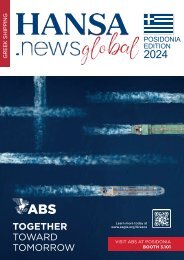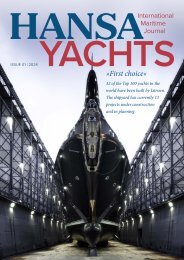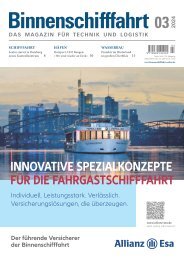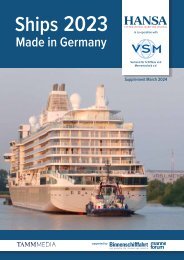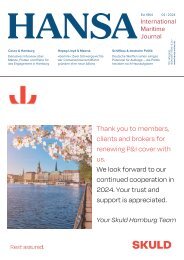HANSA 12-2017
BBC Chartering | Jones Act | Glory Amsterdam | Hellespont | CMA CGM & LNG | Multimodalität | X Freight | Lübeck | Rostock | Hamburg | Neue Katamarane | MSC denkt neu
BBC Chartering | Jones Act | Glory Amsterdam | Hellespont | CMA CGM & LNG | Multimodalität | X Freight | Lübeck | Rostock | Hamburg | Neue Katamarane | MSC denkt neu
Sie wollen auch ein ePaper? Erhöhen Sie die Reichweite Ihrer Titel.
YUMPU macht aus Druck-PDFs automatisch weboptimierte ePaper, die Google liebt.
Schiffstechnik | Ship Technology<br />
shipyards and personal data (e.g. health<br />
monitoring) from the crews and workers.<br />
This might lead to perspectives on ship<br />
design, construction and operation. We<br />
can make quantitative and rational decision,<br />
going beyond traditional intuition<br />
and experience.<br />
Research looks into new ways of interacting<br />
with computers. New computer<br />
architectures mimic the human brain<br />
(neuro-synaptic computing). Future connection<br />
of the human brain and the computer<br />
may expand human capabilities; it<br />
may be possible to transmit one’s intention<br />
by downloading from the brain to a<br />
computer. Inversely, it may be possible to<br />
upload knowledge and skills. The craftsmanship<br />
of workers may be transmitted<br />
directly to the brain (such as neuro-feedback<br />
technique) rather than through instructing<br />
words or texts. Our notion of<br />
training through a tedious process of<br />
nurtured may become history. When this<br />
comes to happen, it will have a major impact<br />
to our society, especially to education<br />
and training schemes.<br />
In any case, ICT technology plays a key<br />
role for innovations in various fields. Advanced<br />
ICT skill will be required by our<br />
maritime workforce and this has implications<br />
also on education.<br />
Kohei Matsuo (M.) bekam den »Inspiring VisionaryAward« von <strong>HANSA</strong>-Autor Hans Payer<br />
und HIPER-Veranstalter Volker Bertram überreicht<br />
Photo: <strong>HANSA</strong><br />
Transport and Logistics<br />
A variety of players in the retail and logistics<br />
industries are competing to build<br />
new infrastructure and business models.<br />
We see the emergence of large, highly automated<br />
logistics facilities with the ultimate<br />
goal to deliver products at customers’<br />
specifications whenever and wherever<br />
they want it. It is inevitable that this trend<br />
will come to the field of shipping as well.<br />
Land-based and sea-based logistics will<br />
be tightly connected.<br />
Various technology start to emerge to<br />
make shipping more competitive, such<br />
as the use of drones, unmanned operation<br />
of ships and ports, new ship concepts<br />
(such as cargo ships with changing hold<br />
arrangement changes for each voyage), or<br />
optimizing operations and logistics based<br />
on Big Data analysis. In addition to optimized<br />
transportation, we may also see<br />
new business models such as adding value<br />
to the cargo while transporting it.<br />
IoT technology and Big Data analyses<br />
are already used for condition based maintenance<br />
schemes and performance monitoring<br />
of ships. In the future, we will see<br />
increasingly unmanned operation of ships.<br />
Environment and Energy<br />
Similar as for cars and planes, we will see<br />
shipping move towards low and eventually<br />
zero CO2 emission scenarios. The vision<br />
of a future zero emission ship (ZES)<br />
combines various energy-saving technologies<br />
and sources of renewable energy,<br />
such as wind and solar power, bio-fuels,<br />
tapping into wave and tidal energy.<br />
Hydrogen technology will play a key role,<br />
as hydrogen allows effcient storage of energy<br />
generated offshore, such as wave and<br />
wind energy, solar power or even artificial<br />
photosynthesis using offshore algae<br />
farming.<br />
In general, sustainable shipping will<br />
play an increasing role. As we need to<br />
protect and preserve the habitat environment<br />
of our oceans, management of<br />
biological resources and water in a sustainable<br />
way will result in the demand for<br />
a “Non-negative Effect Ship” (NES). Design<br />
and operation of ships will then be<br />
aligned with this ultimate goal.<br />
Survey on individual element<br />
technologies<br />
• 116 promising future ship technologies<br />
were grouped in 6 technical fields:<br />
• Materials<br />
• Design and construction of ships<br />
• Ship operation and maintenance<br />
• Transportation and logistics<br />
• Propulsion and engines<br />
• New ship types (Other technologies)<br />
For each element technology, time span<br />
of R&D and impact to maritime industry<br />
were estimated, leading to priority<br />
ratings for:<br />
• CFRP material<br />
• Self-healing material<br />
• Virtual ship laboratory<br />
• 3D printing (additive manufacturing)<br />
• Laser technology (cutting, welding,<br />
bending, etc.)<br />
• Autonomous or unmanned ship<br />
• Robotics (manufacturing robot, drone,<br />
nano robots, etc.)<br />
• Asset Visibility<br />
• Big Data analysis of logistics data<br />
• Superconducting technology<br />
• Hydrogen energy<br />
Author: Kohei Matsuo,<br />
National Maritime Research Institute,<br />
Tokyo/Japan, kohei@nmri.go.jp<br />
<strong>HANSA</strong> International Maritime Journal – 154. Jahrgang – <strong>2017</strong> – Nr. <strong>12</strong> 83




